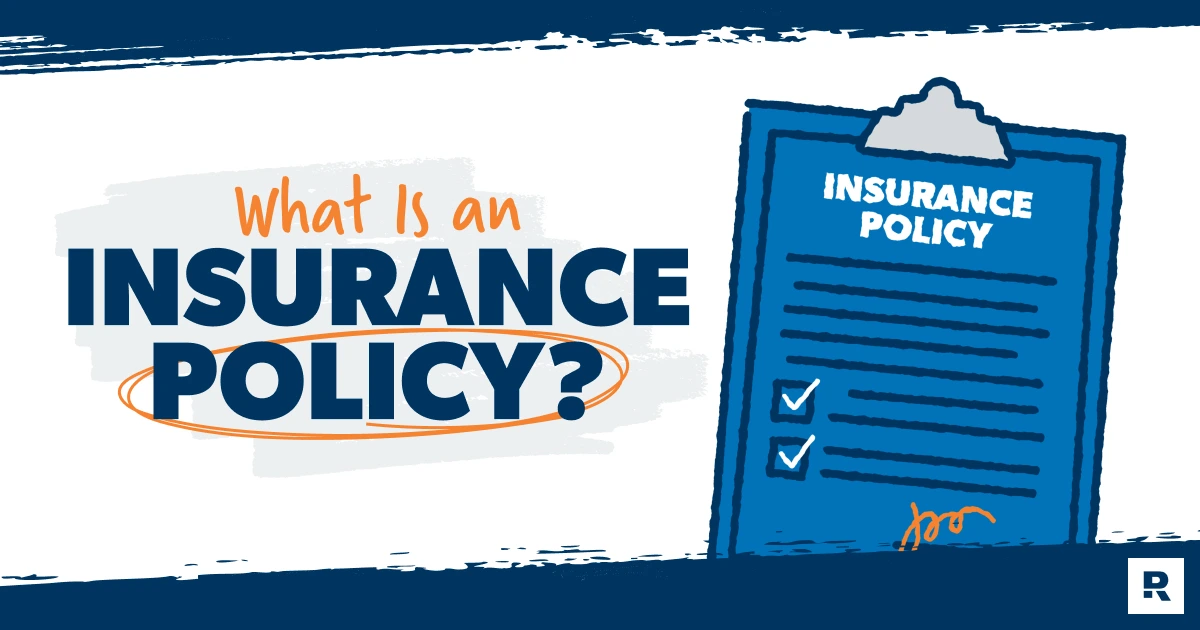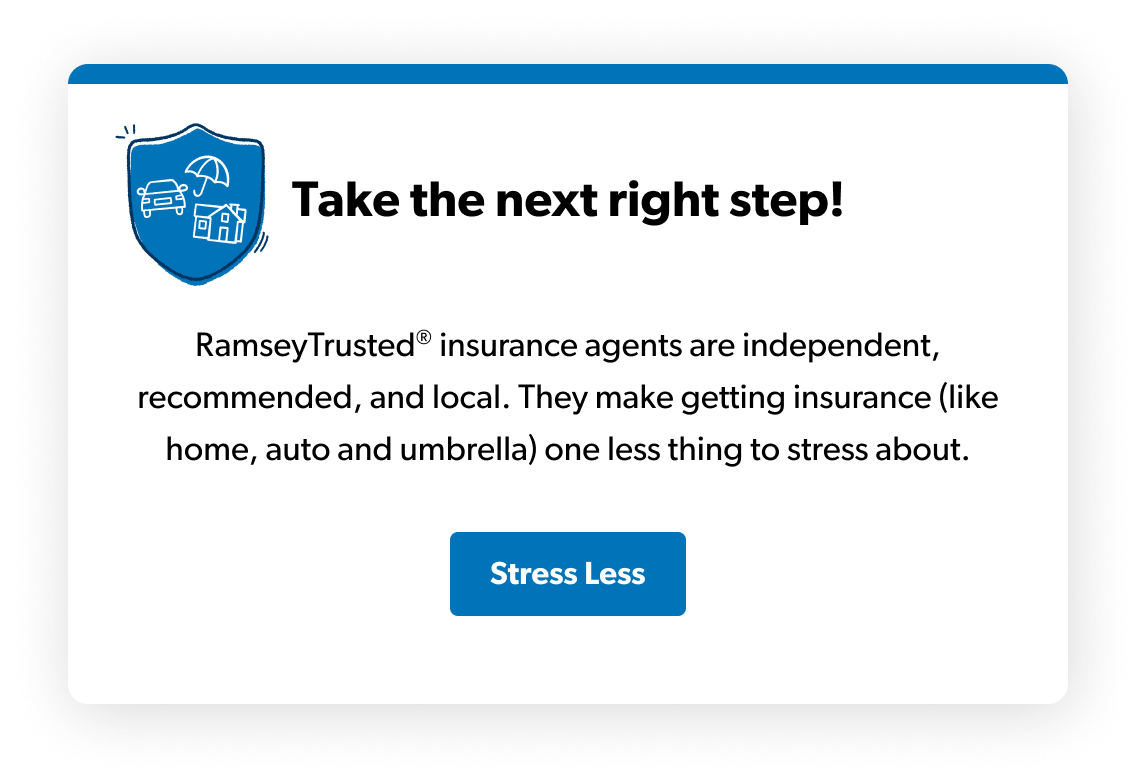
Key Takeaways
- An insurance policy is a legal contract that spells out which risks the insurance company covers and what you’re responsible for.
- Every policy includes essential components like the declarations page, insuring agreement, exclusions, conditions and possible riders.
- Premiums are how much you pay for your policy, and they’re affected by your deductible and coverage limits.
- There are many types of insurance, but the most common include life, health, auto, homeowners/renters and umbrella—each covering different needs.
An insurance policy is a legal contract between you and an insurance company that lays out the details of what’s covered and who’s responsible for paying what. People buy insurance policies for all kinds of things, but the purpose is always the same: to lessen the financial risk of participating in certain things—including life itself!
All set now?
Don’t worry—we wouldn’t leave you there. We’ll get into all the delightful details, like declarations pages and deductibles, so you can get started on your insurance journey.
What’s in an Insurance Policy?
What’s inside an insurance policy might sound more mysterious than what’s in a Hot Pocket—but really, it makes a lot of sense once you break it down (unlike Hot Pocket ingredients . . . what are monoglycerides, and why are they in there?).
Different Parts of an Insurance Policy
Insurance policies have a lot of components and are usually at least several pages long. Here’s what you’ll typically find inside:
- Declarations page: outlines essential details such as the insured party (probably you), coverage limits, policy period and premium amounts
- Insuring agreement: specifies the coverage provided and what the insurance company is responsible for paying
- Exclusions: lays out in detail what is not covered under the policy
- Conditions: lists the responsibilities of both the insurer and the insured
- Definitions: clarifies specific terms used in the policy so you can hopefully understand what it’s saying
- Endorsements and riders: represents modifications or additions to the standard policy terms (usually to provide some kind of extra coverage)
How an Insurance Policy Works
At its core, insurance is a bunch of people pooling their money to cover the small percentage of people in the pool who will experience an unexpected problem—like a car wreck, house fire or broken arm. Everyone pays a set amount based on how risky they are to insure (aka how likely they are to need money from the pool). In a way, everyone’s gambling just a little.
The policy outlines your specific responsibilities and what the insurance company will do for you if you experience the kind of problem the policy is meant to protect you from.
Premiums, Deductibles and Coverage
The three main things outlined in your insurance policy are premiums, deductibles and coverage.
- Premium: the amount you agree to pay a company in order to have insurance—this can be billed monthly, quarterly or annually
- Deductible: the amount you’re responsible for paying out of pocket when you file a claim
- Coverage: the specific types of incidents or losses the insurance company agrees to help pay for
The premium is the up-front cost of insurance, and it can go up or down based on how risky you are to insure.
The easiest way to lower your premium is to choose a higher deductible—that means if an insurable event happens, you’ll pay more out of pocket before insurance kicks in.
Coverage also affects your premium. The more types of incidents and losses you’re covered for, the more expensive your premium will be. But that doesn’t mean you want less coverage—having too little protection could cost you more in the long run.
Claim Process
You hope you never have to use your insurance—but if something goes wrong, that’s exactly what it’s there for. And that’s when you file a claim. If you experience an event you’re insured for, you can file your claim through your insurance company’s app or website or by calling them directly. Here’s how the process usually works:
- You document everything (photos, videos, written information).
- You file the claim (through an app, website portal or by phone).
- Your insurance company assesses the damage.
- They either pay out your claim or deny it (hopefully not the latter!).
Types of Insurance Policies
There are well over 20 different kinds of insurance out there—from pet insurance to kidnap and ransom insurance. But for now, we’ll just go over the main ones: life insurance, health insurance, auto insurance, homeowners and renters insurance, and umbrella insurance.
Life Insurance
Life insurance is there to replace your income for those who depend on it if you die. (That’s why we sometimes call it death insurance.) Though you buy the policy for yourself, it’s really for your family or dependents. So if anyone depends on your income and you don’t already have life insurance, you should get some ASAP.
There are many different types of life insurance policies, but the main ones are:
- Term life
- Permanent life, which includes:
- Whole life
- Universal life
- Indexed universal life
Term life insurance covers you for a set period of time, usually 10–25 years. Permanent life insurance lasts your entire life and has a savings or investment component tacked on. But here’s the problem: Anytime a company mixes insurance with investing, you lose. That’s why you should stay away from permanent life policies. We only recommend term life, because it’s cheaper and does exactly what insurance is supposed to do: replace your income if you die.
Health Insurance
You can get a health insurance policy to help cover medical expenses. This is great news because medical treatments are generally crazy expensive. The details of your policy will vary based on the plan you choose. Common types include:
- High-deductible health plans (HDHPs)
- Health maintenance organizations (HMOs)
- Preferred provider organizations (PPOs)
- Point-of-service plans (POSs)
Auto Insurance
Auto insurance is there to protect you financially if something happens to your car—whether that’s a wreck, a theft, a tree falling on it or another driver hitting you. If you drive a vehicle, you need to have an auto insurance policy.
What’s in your policy depends on the coverages you pay for. These can include:
- Liability
- Collision
- Comprehensive
- Uninsured/underinsured motorist
- Medical payments
- Personal injury protection
The most basic auto policy just includes liability—which covers the damage you cause to another person or vehicle.
Homeowners and Renters Insurance
Your house is likely your biggest financial investment, so it’s a good thing you can buy a homeowners insurance policy to protect it. Or if you’re renting, you can get a renters policy to protect your stuff (because the landlord’s insurance doesn’t).
A homeowners policy can cover:
- Property (your stuff)
- Dwelling (your house)
- Liability (your bank account if someone sues you)
- Additional living expenses (your wallet if you’re forced to elsewhere while your home is being repaired)
If you’re renting, you can get a renters policy to protect your belongings—like furniture, clothes, and gear—since your landlord’s insurance won’t cover any of that.
Umbrella Insurance
An umbrella policy protects your hard-earned wealth from lawsuits above and beyond the liability limits of auto and home policies. We recommend getting an umbrella policy if your net worth is above $500,000.
Buying an Insurance Policy
It’s pretty easy to buy an insurance policy—there are loads of people who want to sell you one. But you do want to make sure you’re buying what you need and getting the best deal.
Who Sells Insurance Policies?
There are a few places that sell insurance policies:
- An insurance company
- An independent insurance agent
- An insurance broker
You can buy a policy directly from an insurance company by going to their website or calling them up. Sometimes they’ll sell multiple kinds of insurance, so if you needed home and auto policies, you could bundle them (and it could save you money). But buying directly from the company isn’t necessarily the best way to go if you want to save money.
An independent insurance agent isn’t connected with any specific company, so they can shop around, grab multiple quotes from different companies, and find you the best deal. We recommend going this route.
Another good option is an insurance broker. Like independent agents, they can find you the best policy from among the masses of insurance companies. The main difference is they’re not actually licensed to sell you the policy directly. Instead, they’ll connect you with the insurance company who’ll take it from there.
What Affects the Cost of My Insurance Policy?
One of the biggest reasons people sometimes don’t buy insurance is the cost. But what you pay for a policy depends on several factors, including:
- Your risk (how you drive, where you live, your health, preexisting conditions, etc.)
- Market factors (anything from car prices to inflation to a string of bad weather)
- Your insurance score (based primarily on your credit score)
Insurance Gimmicks to Avoid
You can also reduce your overall insurance costs by avoiding policies or add-ons you don’t need like:
- Life insurance for kids (unless your kid is the next Macaulay Culkin—then maybe)
- Accidental death insurance (you’re still dead)
- Mortgage protection insurance (life insurance will cover this)
- Cancer insurance (you’re still sick—health insurance is what you need)
When Should I Review My Insurance Policy?
Your insurance policy is something you need to check on every now and then because your needs can change. Here are some times when you need to reevaluate your insurance policy:
- Marriage (or divorce)
- Having kids
- Home value increases
- Salary raises
- New job
- Renovations
- Retirement
Insurance You Can Trust
If you made it all the way down here, chances are you’re serious about buying some kind of insurance policy. Maybe you’re pretty sure you need some coverage, but you’re just not clear on what kind of policy you need. If that’s you, check out our Coverage Checkup.
In less time than it takes to do a BuzzFeed quiz (are those even a thing anymore?), you’ll find out where you’re missing coverage and get an action plan to help you take the next right step.
Next Steps
- Take the Coverage Checkup.
- Follow the action plan.
- If you’re still not sure about what to do, read up on the eight types of insurance you really can’t go without.
-
How do I choose the right insurance policy?
-
The right insurance policy depends on the type of coverage you need—life, health, auto, etc. But a couple general rules are:
- You need enough coverage to make sure you or your family would be okay financially if the worst-case scenario happened.
- If you can afford to pay for something out of your emergency fund, you probably don’t need to cover it with an insurance policy.
-
Can I cancel my insurance policy at any time?
-
Most insurance policies can be canceled whenever you want. For policies like auto and home, if you paid your whole premium up front, you’ll be reimbursed for the unused portion. With term life insurance, just simply stop paying your premium and your coverage will end. But keep in mind, other kinds of life insurance will penalize you heavily if you cancel early.
-
What happens when an insurance policy is backdated?
-
In life insurance, backdating means setting the policy’s start date to an earlier time—typically up to six months before the purchase date. The main reason you might do this is to get a cheaper premium (since younger people usually pay less for life insurance). Just keep in mind: You will have to pay the premiums for those backdated six months.



